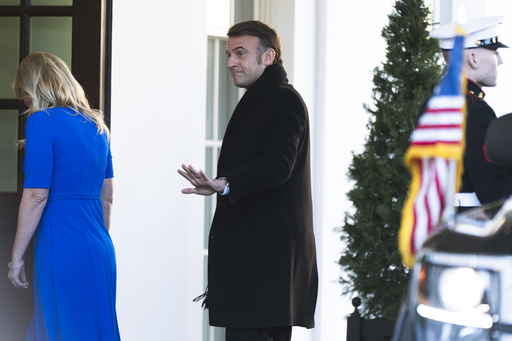WASHINGTON — President Donald Trump hosted French President Emmanuel Macron at the White House for discussions on Monday, amidst growing apprehension regarding the trajectory of transatlantic relations. Trump’s approach to foreign policy has notably shifted, seemingly sidelining European leaders as he strives for a swift conclusion to the conflict in Ukraine.
The day commenced with the leaders engaging in a lengthy virtual conference exceeding two hours with other Group of Seven nation leaders, focusing on the ongoing war. Throughout his presidency, Trump has voiced various territorial demands, including claims over Greenland, Canada, Gaza, and the Panama Canal, alongside aspirations for acquiring valuable rare earth minerals from Ukraine. Only a month into his second term, Trump’s “America First” philosophy looms large, eclipsing what many seasoned U.S. diplomats once viewed as America’s role as a stabilizing force post-World War II.
Concerns are mounting that the principles which underpin the United Nations and various international organizations may be jeopardized if Trump realizes his objectives. Ian Kelly, a former U.S. ambassador and current professor at Northwestern University, expressed dismay over what he perceives as a fundamental shift in U.S. policy, remarking, “80 years of policy in standing up against aggressors has just been blown up without any sort of discussion or reflection.” He criticized the administration’s strategy, arguing that it represents a move toward capitulation rather than strength.
Marking the three-year anniversary of the war in Ukraine, Trump’s reception of Macron comes as political tensions rise. Trump is also scheduled to meet British Prime Minister Keir Starmer later this week. These discussions occur in light of Trump’s recent harsh critique of Ukrainian President Volodymyr Zelenskyy for not successfully negotiating an end to the warfare, as well as rejecting a deal that would allow the U.S. access to Ukraine’s rare earth minerals — essential for various American industries.
European leaders have expressed discontent over Trump’s choice to send high-level officials for preliminary discussions with Russian representatives in Saudi Arabia, a move conducted without the involvement of Ukrainian or European diplomats. This ongoing discord is expected to come to a head at the U.N., where the U.S. plans to introduce a resolution that lacks the urgency found in a proposal from Ukraine and the European Union, which calls for an immediate withdrawal of Russian forces.
Regarding the minerals agreement, Zelenskyy initially reacted negatively, indicating a scarcity of security guarantees for Ukraine. Nonetheless, he mentioned progress in discussions, asserting the importance of a strong economic agreement tied to a substantial security guarantee system for his country. Trump’s administration anticipates a deal could be struck within the week to better intertwine the American and Ukrainian economies, aiming to counter Russian interests.
The relationship between Trump and Zelenskyy has soured; Trump labeled the Ukrainian leader a “dictator” and falsely alleged that Ukraine instigated the conflict. In response, Zelenskyy suggested that Trump operated within a realm influenced by Russian propaganda. Analysts caution that confronting Trump might not yield beneficial results, as it could escalate tensions further.
This intricate situation adds complexity to Macron and Starmer’s forthcoming discussions with Trump. Macron intends to convey the importance of a unified front against Putin, arguing that weakness in negotiations could have far-reaching consequences for U.S. interactions with China, its foremost economic and military rival. “You can’t be weak in the face of President Putin… How can you then be credible in the face of China if you’re weak in the face of Putin?” Macron asserted.
On the contrary, Trump has expressed admiration towards Putin, even suggesting Russia should be allowed to rejoin the Group of Seven major economies, despite its suspension following the annexation of Crimea in 2014. He dismissed Zelenskyy’s concerns over the exclusion of Ukraine from U.S.-Russia discussions, claiming a lack of negotiation leverage can be frustrating.
The administration’s deference to Putin raises concerns among seasoned diplomats. Retired diplomat Robert Wood urged a reevaluation of the current strategy, stating, “Let’s not kid ourselves: Russia started this war, and trying to rewrite the narrative isn’t going to serve the best interests of the U.S. or our allies.”




